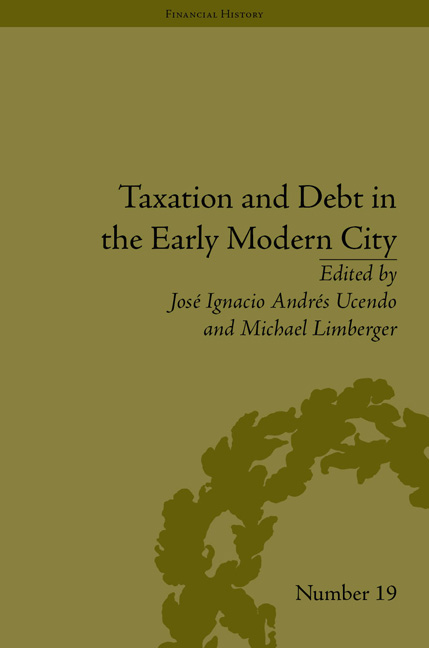Book contents
- Frontmatter
- CONTENTS
- Acknowledgements
- List of Contributors
- List of Figures and Tables
- Introduction
- 1 From Private to Public Management: Tax Farming and Customs Duties in Rome (1630–1700)
- 2 From Taxation to Indebtedness: The Urban Fiscal System of Milan during the Austrias Domination (1535–1706)
- 3 The Urban Tax System in the Kingdom of Naples (Seventeenth to Eighteenth Centuries)
- 4 Public Institutions, Local Politics and Urban Taxation in Seventeenth-Century Aragon
- 5 Taxation and Debt in the Early Modern Castilian Cities: The Case of Seventeenth-Century Madrid
- 6 Tax Collection in Spain in the Eighteenth Century: The Case of the ‘Décima’
- 7 Finances, the State and the Cities in France in the Eighteenth Century
- 8 The Making of the Urban Fiscal System of Antwerp until 1800: Excises, Annuities and Debt Management
- 9 The Dutch Financial System between Public and Private Interests: Urban Debt (1500–1700)
- 10 The Urban Fiscal System in the Habsburg Monarchy: The Case of the Austrian Hereditary Lands in the Sixteenth to Eighteenth Centuries
- 11 Taxation and Debt in Early Modern German Cities
- Notes
- Works Cited
- Index
4 - Public Institutions, Local Politics and Urban Taxation in Seventeenth-Century Aragon
- Frontmatter
- CONTENTS
- Acknowledgements
- List of Contributors
- List of Figures and Tables
- Introduction
- 1 From Private to Public Management: Tax Farming and Customs Duties in Rome (1630–1700)
- 2 From Taxation to Indebtedness: The Urban Fiscal System of Milan during the Austrias Domination (1535–1706)
- 3 The Urban Tax System in the Kingdom of Naples (Seventeenth to Eighteenth Centuries)
- 4 Public Institutions, Local Politics and Urban Taxation in Seventeenth-Century Aragon
- 5 Taxation and Debt in the Early Modern Castilian Cities: The Case of Seventeenth-Century Madrid
- 6 Tax Collection in Spain in the Eighteenth Century: The Case of the ‘Décima’
- 7 Finances, the State and the Cities in France in the Eighteenth Century
- 8 The Making of the Urban Fiscal System of Antwerp until 1800: Excises, Annuities and Debt Management
- 9 The Dutch Financial System between Public and Private Interests: Urban Debt (1500–1700)
- 10 The Urban Fiscal System in the Habsburg Monarchy: The Case of the Austrian Hereditary Lands in the Sixteenth to Eighteenth Centuries
- 11 Taxation and Debt in Early Modern German Cities
- Notes
- Works Cited
- Index
Summary
The tax systems of early modern Europe have attracted increasing interest in recent decades in view of their evident importance to economic history, and yet the research effort has been uneven. The clear priority of European historians has been the study of state taxes, an area that has benefited from the relative accessibility of historical sources held in national archives, which have yielded valuable information given the growing fiscal powers of the modern state. Local taxation has been largely ignored, however.
In view of the difficulties inherent in the study of local taxation in the early modern period, European historiography has tended to concentrate on the major cities as the principal centres of economic activity and tax revenues. However, this focus causes some problems. The general absence of agrarian towns in studies has made it difficult to establish nationwide comparisons that would provide a coherent overview of local taxation, the development of the tax system and its economic and social consequences. The purpose of this paper is, precisely, to study the fiscal systems set up by the local communities of a region whose urban structure was characterized by the preponderance of agrarian towns: the Kingdom of Aragon.
It is well known that any reform of urban taxes and finances attempted during the Ancien Régime was conditioned not only by the economic capacity of each town or city, but also by political and social consensus (or conflict) and that, given the authorities’ limited control, social responses to tax pressure could have major consequences for municipal economies.
- Type
- Chapter
- Information
- Taxation and Debt in the Early Modern City , pp. 67 - 84Publisher: Pickering & ChattoFirst published in: 2014

